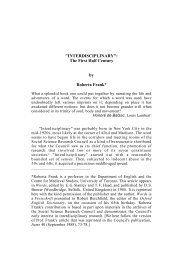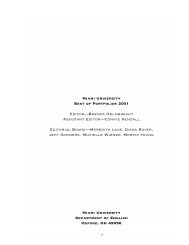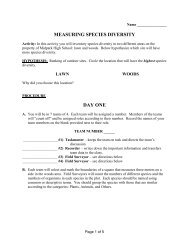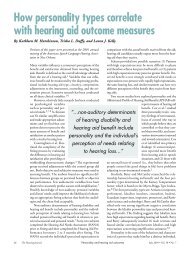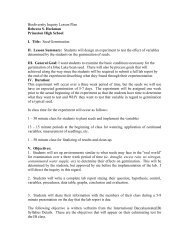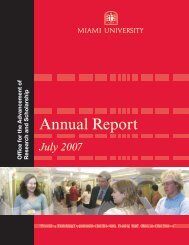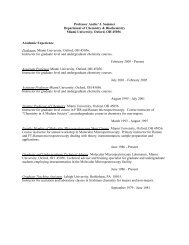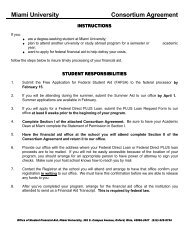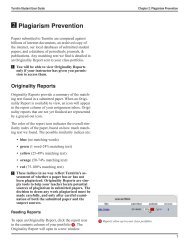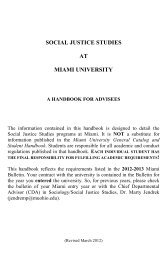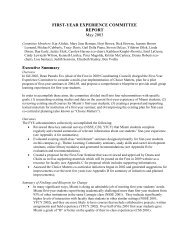Interdisciplinary Research Manual - Units.muohio.edu
Interdisciplinary Research Manual - Units.muohio.edu
Interdisciplinary Research Manual - Units.muohio.edu
You also want an ePaper? Increase the reach of your titles
YUMPU automatically turns print PDFs into web optimized ePapers that Google loves.
33<br />
• Similar or overlapping phenomena can have different labels because they are studied by<br />
different disciplines (e.g., social movements from sociology and interest groups from<br />
political science; ads from marketing, illustrations from graphic design, and persuasive<br />
visual communications from communications). If you can identify the factors or variables<br />
that produce the major distinctions between them, you can construct a model that sets out<br />
the network of interrelations between those disciplines.<br />
• The separate topics such as economic development, environmental impacts, and disease<br />
prevention may all relate back to a single theme, such as sustainability; if that theme is at<br />
the heart of your project, what you’ve done is validate your choice of books and give a<br />
label to your criterion for selecting them.<br />
• Discourse communities go through cycles of intense debate which culminates in one<br />
group winning out, stalemate, or perhaps (as in the nature-nurture debate) the recognition<br />
that both sides were partly right, followed by a period of “normal science” (a la Thomas<br />
Kuhn) in which all the implications of that paradigm are worked out. During the early<br />
period, you tend to find hot argument, lots of sides, and little evidence to back up any<br />
position—debates generate more heat than light because they’re based more on<br />
presupposition than on fact. As time goes by, the field develops clearer definitions and an<br />
evidentiary base that can be used to settle disputes, so positions start to coalesce; and by<br />
the later period, “debate” becomes mostly a matter of emphasis—it’s over differences in<br />
degree not type. But at some point, perhaps as much as a generation later, another major<br />
issue will flair up, and the cycle will resume. Part of what you’re doing when you come<br />
on a literature for the first time is finding out where it is in this cycle. After all, it’s the<br />
luck of the draw where in that cycle you happen to first encounter a literature, where the<br />
field is in its evolution. It’s quite possible to find that a discourse community is in a<br />
mixed part of the cycle, with a couple issues hotly debated and several others engaged in<br />
normal science. But it’s also possible that you’ve failed to identify the issues for any of<br />
the reasons discussed in this manual.<br />
• Whenever you encounter a topic or issue across an ideological divide, with deeply<br />
embedded beliefs or powerful emotions on both sides, there will be a lot of distortion of<br />
the opposing side. People talk past each other rather than engage each other’s ideas. At<br />
least you have a topic or issue that is obviously important. Other projects will find<br />
themselves trying to convince readers their topic or issue is worthy of attention, worth<br />
taking seriously.<br />
• An issue you thought was contemporary may have been going on for a long time,<br />
perhaps under a different label, especially if it is a really basic or fundamental issue.<br />
• If the same terms keep popping up in different books, you can go on line to Sherlock<br />
and do key word searches for those terms to see what else has been written on them.<br />
• Even though you’re trying not to look for connections, organizing the literature review<br />
by topic and then issue helps you see where the connections need to be made.<br />
Literature Review Presentations<br />
Literature review presentations focus primarily on problems you encountered in<br />
completing your first lit review. Like earlier presentations, they are not graded, and the<br />
point is not to show off what you know, but to get help with what you don’t understand.<br />
In your lit review presentation, you should tell people what approach you took to that lit<br />
review, what problems you ran into implementing that strategy, and where you need help.



